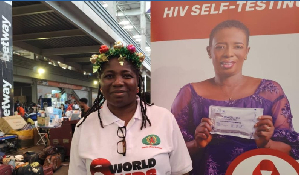 Ashanti Regional Technical Coordinator of the Ghana AIDS Commission, Olivia Graham
Ashanti Regional Technical Coordinator of the Ghana AIDS Commission, Olivia Graham
The Ashanti Regional Technical Coordinator of the Ghana AIDS Commission (GAC), Olivia Graham, has expressed concern over the increasing number of HIV infections in the region.
Currently, Ashanti Region has over 66,000 cases of HIV infections, with less than 50 percent of the infected individuals undergoing Antiretroviral Therapy (ART), despite the availability of the treatment.
Ms. Graham shared this information in an interview with the Ghana News Agency during a free multiphasic health screening event organized by the GAC to mark World AIDS Day in the Ashanti Region.
The multiphasic health screening, held at the Kejetia Market in Kumasi, included HIV testing, blood sugar level checks, blood pressure (BP) monitoring, and Body Mass Index (BMI) assessments. Free condoms and HIV self-test kits were also distributed to those who checked their HIV status or wished to conduct tests at home.
The theme for this year's World AIDS Day celebration was "Take the Right Path: Ending AIDS Together."
Ms. Graham revealed that 3,650 new cases of HIV were recorded in 2023, indicating that approximately 10 people are being infected with the virus every day in the region.
She explained that the main objective of the multiphasic screening was to encourage people to get tested for HIV, as many individuals are reluctant to take the test.
“The HIV test does not provide a positive or negative result immediately, but rather a reactive or non-reactive result, which takes just 15 minutes to process,” she clarified.
Ms. Graham noted that individuals with reactive results were counseled and referred to a health center where further HIV tests would be conducted to confirm their status.
She emphasised that HIV is no longer a “death sentence” because effective treatments are available. When taken consistently, ART can reduce the viral load in the body.
Ms. Graham encouraged all citizens to get tested to know their HIV status and, if positive, seek treatment to help meet the target of ensuring 95 percent of those infected are on treatment. This, she said, would help prevent the spread of the virus in the region and across the country.
Ms. Princess Owusu-Ansah, a young woman in her early 20s, shared that she is sexually active and wanted to get checked for HIV to know her status.
“This is my first time checking my HIV status, and I’m not scared. It’s important to always know that you are healthy, so I want to take advantage of the free screening,” she said.